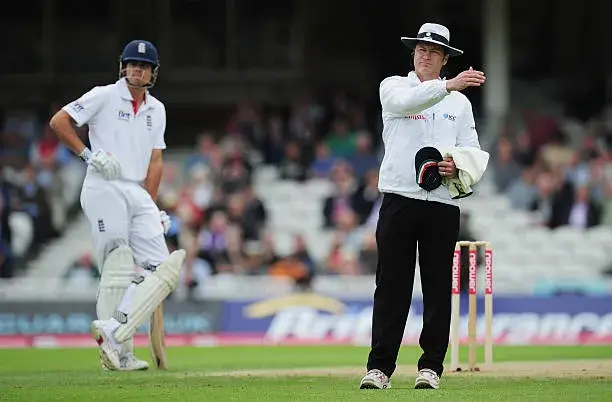The Umpires Wrong Decision is not a big thing in cricket history. The lesson of the history of Test cricket spanning nearly two centuries is that there is nothing greater than the game. Australian batsman Chris Lynn says that if someone tries to dominate the game by going beyond the limits, then the game will fight back in its ways.
Late Shane Warne once commented on Aleem Dar’s umpiring and said that if a bowler or a batter shows bad form, he is out from the team, but even when the umpires are showing bad form repeatedly, ICC takes no action.
However, the ICC has standards for evaluating the performance of umpires and a rating system is also active to decide regular rankings. In addition, opposing teams are also allowed to express their grievances in a report given to the referee after the match.
Umpires Joel Wilson Wrong Decision:
Joel Wilson, the umpire included in the ICC elite panel, is a West Indian umpire from Trinidad and Tobago.
Joel made his umpiring debut in the 2011 ODI match between West Indies and India.
Wilson has so far umpired in 46 Test matches, 113 ODIs, and 59 T20 matches.
Saud Shakeel’s controversial decision in the Multan Test is not the first time that umpire Joel Wilson has given a wrong decision.
In the 2019 Ashes series, Joel Wilson made eight wrong decisions, including Ben Stokes‘ lbw decision in the Headingley Test, which cost Australia lost the match.
AUSTRALIA ROBBED!
No reviews left for Australia, and this was given not out by Joel Wilson. An absolute disaster for Australia. Two to win for England.https://t.co/gBfzVPwZ0f #Ashes #ENGvAUS pic.twitter.com/hsyLdRakRF
— Fox Cricket (@FoxCricket) August 25, 2019
The decision was described as a ‘tragedy’ by the Australian channel Fox Sports. On the other hand, this Multan Test is not the first time that a West Indian umpire has given wrong decisions.
Before this, in the Test match between Pakistan and West Indies played in Antigua in 2000, West Indian umpire Billy Doctrove gave decisions in favor of West Indies, which Pakistani fans are still protesting, while in 2008, Sydney was between India and Australia. West Indian umpire Steve Bucknor gave controversial decisions against India in the Test match played in India, due to which this Test match is the most controversial Test in history.
Umpires Aleem Dar Wrong Decision:
There is no doubt that Aleem Dar has been an umpire of high caliber and has been declared the best umpire of the ICC, but humans and humans can never be separated. Although even the best decision-makers can commit mistakes in the most difficult moments, in a game like a cricket, such mistakes change the outcome.
Pakistan is favorites to win the match but after the controversial dismissal of left-handed batsman Saud Shakeel, the game turned and England took all the remaining wickets of Pakistan.
Saud Shakeel was playing on 94 runs when the English fast bowler Mark Wood took an edge in an attempt to hit the leg side, which was caught by Ollie Pope standing behind the wickets. However, it seemed that the ball had left the wicketkeeper’s gloves and hit the ground. Umpire Aleem Dar sent the decision to third umpire Joel Wilson but gave a soft signal out himself.
I think it touches the ground at some point may be its just me #PakvsEngland pic.twitter.com/csMaUYb7Er
— Najeeb ul Hasnain (@ImNajeebH) December 12, 2022
Also Read: ICC World Test Championship Brief Analysis
It is quite possible that even if Aleem Dar had not given that controversial decision, Markwood, Anderson, and Robinson would have won the series with the magic of their pace. But this controversial decision of Aleem Dar gave not only Test cricket, but also the beauty of this memorable English win.
In 2009 Champions trophy Semi Final same Wrong decision happened.
Umpires Simon Taufel Wrong Decision:

But in the recent history of cricket, there has rarely been any clear action against an umpire’s decision-making mistakes. There has never been any significant reaction to cricketing decisions, apart from a few crackdowns on the wrong determination of playing conditions in match management matters.
In the semi-final against New Zealand in the Champions Trophy 2009, when Pakistan was on the verge of setting a formidable target, Umar Akmal was in top form and the ICC’s best umpire, Simon Toffle, was overseeing his innings. Toffle dismissed Umar Akmal on an LBW appeal, and the Pakistani innings collapsed.
On the next day of the match, Simon Toffle personally met Umar Akmal and admitted his mistake, and apologized.
ICC Faults:
The fault is not only that of the umpires, BUT the ICC is also much more complicit.
Where dozens of rules every year, and a half, and the determination to improve the game, why can’t a pointless law like soft signal be revise?
It is rather ridiculous that on the one hand the umpire is admitting his dilemma and turning to technology and on the other hand he is giving his ‘idea’ on it.
The purpose of introducing the DRS system was to review the umpire’s decided to restore the beauty of the game affected by controversial decisions, but rules such as umpires’ calls and soft signals have ruined the spirit of the entire system. From 2021, the IPL has done away with the rule of on-field umpire’s soft signal.
Interestingly, in response to criticism of these rules, the ICC’s general argument has been that umpires are also human and there should be room for human error. But the question is that when the ball goes outside the off stump, there is a slight error by the batsman and the outer edge of the bat tampers with the ball which neither the umpire nor the umpire can see.
